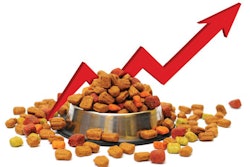
Days after a Pakistan meat processor announced that it would export $1 million worth of pet food to United States and Europe — a first for the country — the government declared that it plans to ban pet food imports along with 800 other items considered “luxury” goods.
A notice to the Pakistan Stock Exchange states that The Organic Meat Company Ltd. (TOCML) is “the first company from Pakistan to successfully export pet food to Europe, and is also the pioneer to export the same to USA market earlier.”
TOCML has a meat processing plant in Karachi where it plans to develop new line of pet food products for the export market. No data was shared on how they would split the annual orders of $1 million worth of pet food between their American and European export partners.
This news capped gains that TOMCL reported in its financial statements for the period ended March 31, 2022, with 28% sales growth over the same period last year to reach Rs3,449 million.
Can a pet food import ban can encourage local production?
A possible ban on imported pet food could incentivize local manufacturers to meet demand at home, which leans towards foreign brands mainly for better quality and safety reasons. But the immediate reason for it, according to the federal cabinet, is to control the country's rising import bill that has strained its foreign currency reserves.
Dog food and cat food are lumped together with food and non-food products that range from cars and mobile phones to cosmetics and cigarettes. Also on the list of banned imported goods are items that pet owners might need to raise dogs and cats in the house, such as kitchen and sanitary ware, fish, frozen meat and frozen fish, tissue paper, shampoos and other toiletries.
The ban will probably last for two months and if not, the Ministry of Finance is considering doubling the import duties and taxes on the said products instead. The World Trade Organization and the International Monetary Fund have opposed the import ban on luxury items.
Pakistan's information minister Marriyum Aurangzeb said at a public forum that reducing the country's dependence on imports and focusing on exports is part of the government's economic plan to help local industries to prosper and create more jobs. She also said importers who already booked and paid for their orders before this looming ban could proceed, but that would be the last until the ban is lifted.

















